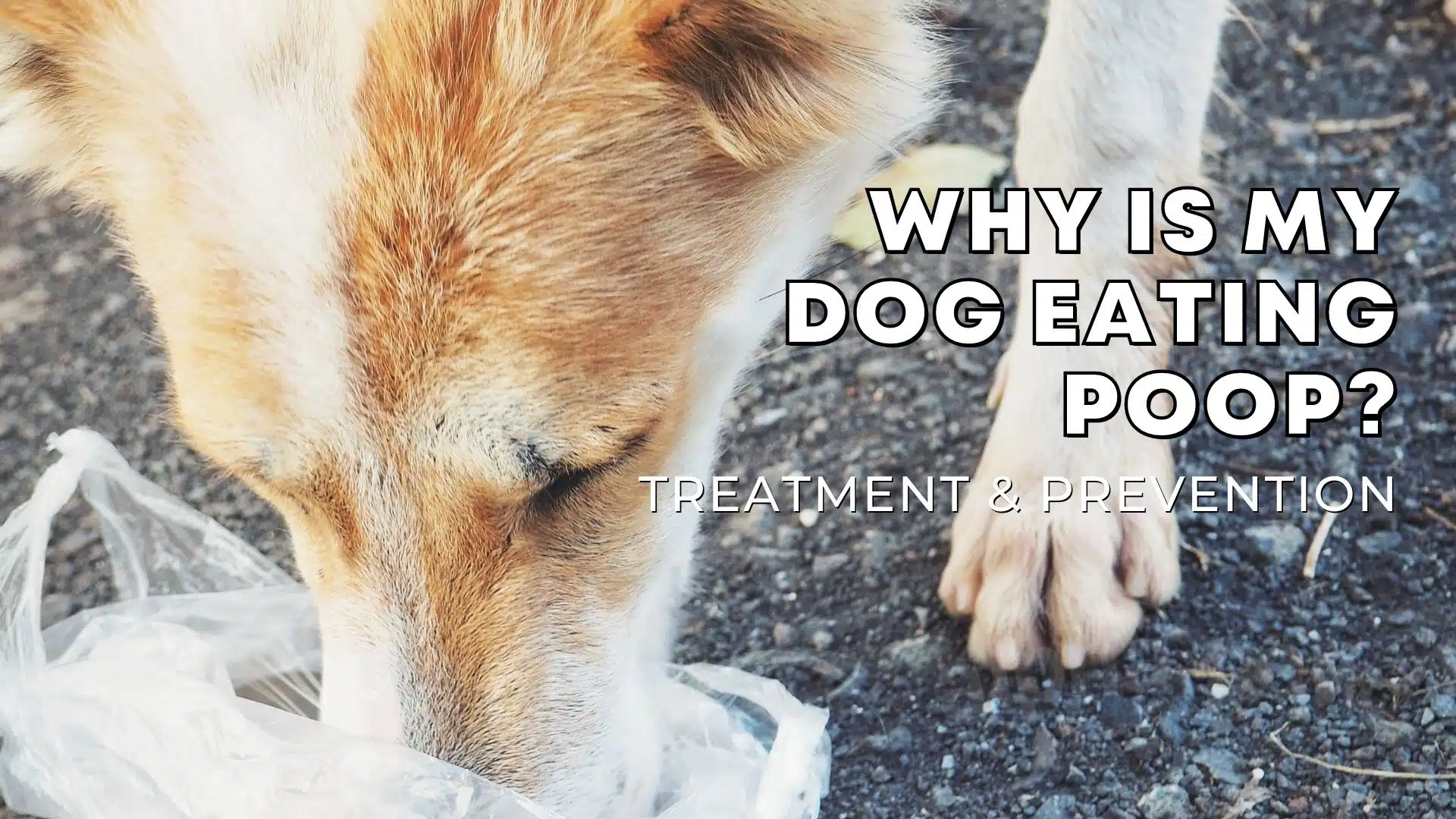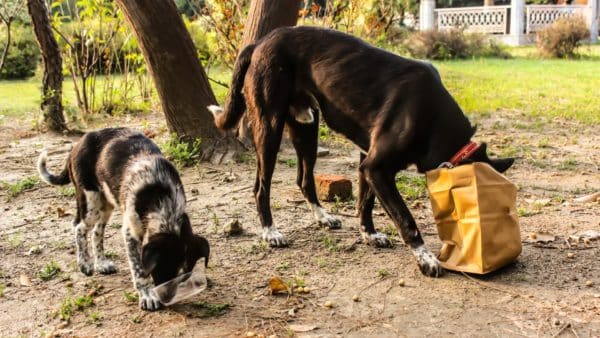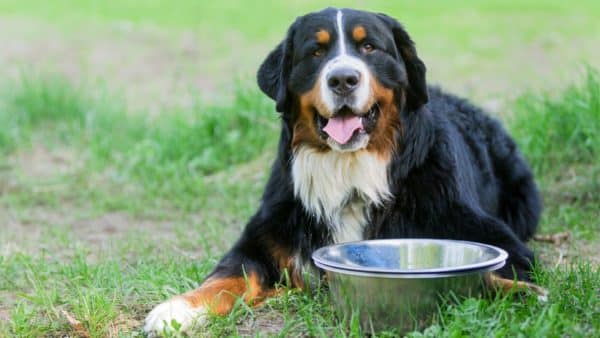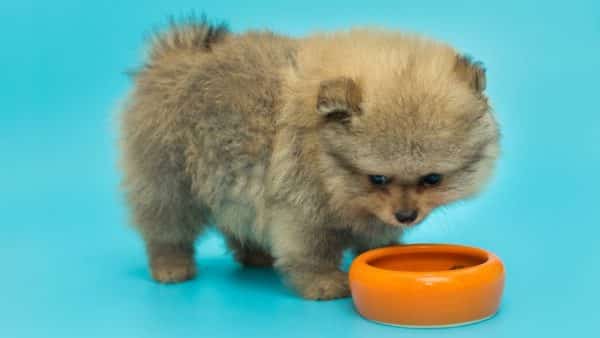

There are two main reasons why dogs eat poop – a medical issue or a behavioral issue. Sometimes, you might be able to prevent your dog from eating poop. It does require lots of dedication on your part. Luckily, the methods are not complicated and even children can help. We will discuss the methods in the sections below.
Unfortunately, there are instances when stool eating might not stop no matter how much you try. In that situation, you cannot prevent or stop your dog from eating feces unless you go to the vet so they can be diagnosed properly. The only thing you can do is to clean their paws and mouth properly so they are not licking their paws and causing more issues.

Vitamin and mineral deficiencies can make dogs eat apparently unnatural things. But there is a disease is called Pica and will make a dog eat other things, not just poop – such as the paint on your walls or rocks. Chewing on household furniture, rotten wood or rocks can also expose them to other kinds of health dangers such as parasite infections.
A lack of digestive enzymes can also cause stool eating. Digestive enzymes are extremely important when it comes to how your dog’s body absorbs nutrients from food. If they do not have enough, adult dogs will try to get sustenance from other sources.
A lack of hydrochloric acid can also lead to your dog eating its own poop. In this case, while your dog is eating enough food, there might not be enough hydrochloric acid in their digestive system to break down the proteins from dog food — which will make your pooch eat poop in an attempt to get the nutrients that they need.
Understanding the ingredients in dog foods, and what your dog can and can’t eat is important. This information will be very important to the vet so keeping a log of their diet is recommended when you start to notice your dog is eating poop.
Is your pet safe?
1 in 3 pets will need emergency veterinary treatment each year and it is estimated a pet receives emergency care every 2.5 seconds in the U.S.
The average cost of treating a broken bone in dogs is $2,700. Cancer treatments? Up to $10,000.
It’s why so many pet owners say their biggest regret isn’t the vet bill—it’s not having pet insurance when they needed it most.
Ask yourself: “If an unexpected $5,000 vet bill hit tomorrow, could I afford it?”
If the answer is no, it’s time to get covered.
Take a look at Lemonade. They have a great app that actually works, they have an instant chatbot that is faster and, dare we say it, friendlier than most companies’ “real” customer service and a quick scroll through Reddit will uncover… people are really vibing with this brand.
So go check them out and take a look. It takes less than a minute.
Dogs that have parasites eat their own poop in an attempt to recover some of the nutrients they lost due to the parasite infestation. Sadly, internal parasites are usually located in the intestines. If the parasites reproduce in the small intestine, the dog’s digestion can be completely ineffective.
Intestinal malabsorption in dogs can be caused by a very large number of conditions from exocrine pancreatic insufficiency to inflammatory bowel disease.
Small intestinal bacterial overgrowth can lead to malabsorption, too, but stool eating is also common in dogs that have dietary sensitivities and neoplastic infiltration.
We’ve already mentioned exocrine pancreatic insufficiency, but it is far more common than you might think. Some dogs that eat their own poop can have a too low amount of pancreatic enzymes in their system, which makes them incapable of absorbing the nutrients from the food they eat.
Besides poop eating, pet parents can notice other symptoms if their dogs have this health issue, such as weight loss or diarrhea.

Any dog that doesn’t benefit from proper nutrition will resort to eating poop. Even worse, they might even eat the poop of other dogs, which could create serious health complications — but we’ll give you more details on that in a section below.
When a dog’s food does not contain the right ingredients, pets can use coprophagia (the scientific term that describes poop eating) as a means of getting the nutrition they need. Setting a consistent feeding routine is important for your dog. Then, if your dog is still hungry after feeding time, it may indicate an underlying issue.
No matter the type of chews or kibble you pick for your dog, it needs to provide them with the right sustenance so that they aren’t tempted to steal food or engage in coprophagia. Dog food and Multi-Vitamin Chew is highly recommended for maintaining a healthy diet for dogs.
Boost your canine companion’s overall health with the introduction of essential multivitamins into their daily routine. Specially formulated to meet the unique nutritional needs of dogs, these supplements provide a comprehensive blend of vitamins and minerals crucial for their well-being. From supporting immune function and promoting healthy skin and coat to aiding in proper bone development, multivitamins offer a holistic approach to canine health.
When a dog eats poop, something is clearly wrong, but it could be something in their environment, not their body. Sometimes, stress and anxiety will cause a dog to react in atypical ways such as eating poop.
If you’ve taken your canine friend to the vet for a checkup and they weren’t able to find any physical change that could lead to this behavior, your dog might be anxious or stressed because of a reason. Unfortunately, we don’t speak dog language and they don’t speak the human language. Learning the reasons and then helping your dog reduce her stress can be difficult.
For example, dogs may eat poop when they have general anxiety, but they could also constantly worry about being locked up in the house without you being there.
Other dogs can suffer from separation anxiety and there is, of course, a large category of dogs that can become sad or stressed when they don’t get enough exercise or their owners don’t play with them enough.https://www.alphapaw.com/blog/im-having-trouble-dealing-with-my-pups-separation-anxiety-when-i-leave-for-work-what-can-i-do/
Anxious dogs should be given calming chews on a regular basis.
Let’s face it. Your dog’s poop isn’t the most appetizing thing in the world. But a bored dog may resort to a variety of activities if they lack any other entertainment opportunities.
If you leave your pup alone at home (make sure it’s puppy-proofed) for all of the hours you’re away to work, you can’t expect your pet to be completely content with the amount of boredom, inactivity, and loneliness they have to cope with.
Bored dogs will chew on your shoes (especially if they don’t get enough chews or treats and they’re still puppies and teething), will ruin pillows, and last, but not least, eat poop.
Eating poop is more common for puppies as they are more likely to have as many experiences as possible. They also want to find out how things taste, so poop eating can be quite common in their case.
However, most puppies will stop coprophagia if they get the right nutrients from dog food and if they are engaged in a variety of physical activities. Puppies may also become bored and exhibit this behavior, and we all know how active young dogs can be.
If you made the mistake of punishing your dog if they’ve had an ‘accident’ and peed or pooped indoors rather than waiting for you to take them out for a walk, your dog may become concerned.
All of this worry can lead to them eating poop so that you don’t have to see it. In other words, your dog can eat the poop just to hide it from you.
Properly potty training your dog will benefit both of you in the long run. Whether it’s training to use the bathroom outside or inside on a pee pad, never hit a dog when she has an accident. Swiping, hitting, and pushing your dog will only cause more behavioral issues in the long run. Always train your dog with positive reinforcements.
Dogs may sometimes resort to eating poop as a means of telling you that something’s up and that they need more attention and care from you. It might not be the best way of showing you this, but the behavior often works.
If you seem receptive to this type of behavior, it’s very likely your dog will do it again to get your attention.
First of all, since you can’t know for sure the exact reason your dog has this strange behavior, our first advice is to take your dog to the vet hospital. Secondly, keep your home clear of poop.
If your dog just used a pee pad, clean it up promptly. If you are walking your dog, scoop up the poop immediately with a strong, odor-absorbing poop bag. You don’t want your dog to tear the bag or be distracted by it during your walk.
Vets can use a variety of diagnostic techniques to find out what’s wrong (if there is anything wrong, that is) with your dog. Keep in mind that sometimes medical issues might not be at the root of the problem. Below are two nonmedical reasons why dogs could be eating poop.
Chances are that if you give your dog enough attention, spend quality time with your pet every day, you aren’t going to see any stool eating. Knowing when your dog is happy or sad, and understanding how to care for them will go a long way in reducing their stress and thereby, poop eating.
Low-quality dog food that lacks the necessary nutrients a dog needs could trigger poop eating. We recommend feeding a high-quality dog food. In addition, give them probiotics, supplements, as well as plant-based digestive enzymes. More often than not, this behavior will disappear.
Sometimes poop eating is just a bad habit. Dogs, like humans, can develop different habits and not all of them are good. As we previously noted, dogs sometimes eat poop out of because they want your attention, or as a way to relieve stress. Over the years, it becomes a bad habit that needs to be broken.
Feces aren’t rich in a particular nutrient. In fact, they are lower in nutrition and also contain a variety of potentially dangerous things (such as germs). It has little to no effect on a dog’s diet and it doesn’t significantly modify the nutrients that the animal receives.
They are less dangerous than some of the common household foods that are toxic to dogs.
Wiping your dog’s mouth out can be quite challenging and now too many dogs are going to like the technique. But something must be done since the smell of the feces combined with your dog’s regular bad breath can be a disaster and very hard to take.
You can use coconut oil, saltwater, and a wet cloth to get the visible remains removed at first. Then you should give your dog food and water.
A dental chew or dog mouthwash can prove their worth in this situation. Whatever you do, avoid using human mouthwash as it contains a series of dangerous ingredients and alcohol, which dogs should never drink.

While poisoning as a result of poop eating is quite rare, it is true that stools aren’t exactly clean. If a dog eats their own poop, they might not get sick at all other than experience mild digestive distress due to the bacterial growth in the feces.
The real problem is when a dog eats some other animal’s poop. When that happens, they can pick up a variety of things from potentially dangerous bacteria to internal parasites — which can make matters even worse as they might cause malabsorption and make the dog eat poop even more.
If you are worried about your dog eating poop but they are still a puppy (less than nine months of age), chances are that this behavior will disappear when they get older. It’s also more common in puppy mills as puppies there experience a very high level of stress. Fortunately, it usually goes away on its own after the pup finds a loving home.
Did your dog go through a phase of eating poop? If so, what happened and how are they now? Share your story in the comments.
Most of us train our dogs when they are puppies to jump up on furniture. We think it’s harmless (and easier than always lifting them), but for dogs, couches and beds are very high compared to the size of their bodies.
Every time they jump it compresses their back and applies enormous force to their joints.
It’s no wonder that an incredible 80% of dogs experience arthritis or joint pain by only 7 years old.
Luckily, there is a vet-recommended solution.
It’s the PawRamp by Alpha Paw. An adjustable ramp that allows dogs to safely get on and off couches and beds. PawRamp makes joining you in bed or on the couch effortless and fun.
As a bonus, you can use code SAVE35 to get $35 off the PawRamp today.

The medical, nutritional, or behavioral advice we provide is intended for informational and educational purposes only. Our editorial content is not a substitute for formal or personalized medical advice from a veterinary professional. Only board-certified veterinary specialists who have examined your pet should diagnose medical conditions, provide personalized treatment, or prescribe appropriate medication. For questions regarding your pet’s health, or if your pet is exhibiting signs of illness, injury, or distress, contact your veterinarian immediately. Never disregard professional medical advice or delay in seeking it because of something you have read on our site.